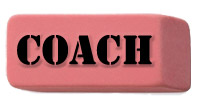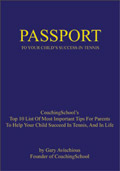The Role of Mistakes
I just ran across an article yesterday that is very important for coaches. Teaching is one of the two most important functions of a coach and this article provides some significant insight into the role of mistakes not just in the classroom, but in life and and the sport you coach.
Read the article and then look at the coach discussion points.
The Role of Mistakes in the Classroom
BY ALINA TUGEND
“As the school doors swing open to welcome the start of another year, both teachers and students will have goals: to inspire a class, to learn new things, to get good grades.
What probably won’t be on that list is to make a mistake — in fact many. But it should be.
Why? Because we’re raising a generation of children — primarily in affluent, high-achieving districts — who are terrified of blundering. Of failing. Of even sitting with the discomfort of not knowing something for a few minutes.
If students are afraid of mistakes, then they’re afraid of trying something new, of being creative, of thinking in a different way. They’re scared to raise their hands when they don’t know the answer and their response to a difficult problem is to ask the teacher rather than try different solutions that might, gasp, be wrong.
They’re as one teacher told me, “victims of excellence.”
Why is this? Because success in school is too often defined as high marks on tests. And if results are all that matter in education, then mistakes play no positive role. They are only helpful if we believe that the process of learning — which inevitably must include the process of erring — is just as, or more, important than getting to the correct answer.
I realize that parents play a crucial role in how their children view mistakes — and I’ve written about that — but here, I’m focusing on educators.
While writing my book Better by Mistake: The Unexpected Benefits of Being Wrong, I came across some fascinating research about how children learn and what message they take away about mistakes.
Carol Dweck, a professor of psychology at Stanford University, has conducted groundbreaking research in this area. One of her experiments asked 400 5th graders in New York City schools to take an easy short test, on which almost all performed well. Half the children were praised for “being really smart.” The other half was complimented “having worked really hard.”
Then they were asked to take a second test and given the options of either choosing one that was pretty simple and they would do well on, or one that was more challenging, but they might make mistakes.
Of those students praised for effort, 90 percent chose the harder test. Of those praised for being smart, the majority chose the easy test. Dweck has conducted such experiments and studies in a variety of school districts — low-income, high-income, homogenous and mixed- culture and races.
A cornerstone of Dweck’s research is the concepts of fixed mindsets and growth mindsets. Those with fixed mindsets, as Professor Dweck says, believe people are good at something — either good at math or music or baseball — or they’re not. For those with a fixed mindset, mistakes serve no purpose but to highlight failure.
Those with what Professor Dweck calls growth mindsets — who believe that some people are better or worse in certain areas but we can all improve and develop our skills and abilities — are much more likely to be able to accept mistakes because they know they’re part of learning.
And studies in a secondary school have shown that when students are taught about growth mindsets and that the brain is malleable, their motivation to learn dramatically increases. Take a look at the web site www.brainology.us if you want to learn more.
This doesn’t mean, of course, that we can all be world-class chess players or pro athletes, but rather that we all have a much greater ability to develop our potential than we think we do. It takes hard work, however, and we can’t do it without taking chances and making mistakes.
Embracing such an ideology also means, to circle back, that the emphasis in schools must be on the process of learning, not solely the results. I know this is difficult in our country now, particularly when so much stress is put on standardized tests — which are all about results and not exploring different ideas — as a way to measure the success of both teachers and children.
But it can be done. We can learn from other cultures — for example, in Japan, children are allowed, and expected, to work out a problem in front of the class for 10 minutes or more. Even if the student is wrong, there is no shame. Mistakes are an indication, not of failure, in these classrooms, but of what still needs to be learned.
I also know a group of fourth-grade and fifth-grade teachers in New York who, inspired by the idea that children need to learn to make and live with mistakes, are developing their own lesson plan to build resilient learners. The idea is to help students examine the ideas of effort and persistence, learn to take risks and accept imperfection and be willing to sit with the uncertainty of not knowing.
It’s a big task. But over time, I think we can teach students how to shift the prism at least slightly, so they look at mistakes not as something to be dreaded and avoided, but as an inevitable — and often very helpful — part of learning. (end article quote)
Journalist Alina Tugend (@atugend on Twitter) is the author of Better By Mistake: The Unexpected Benefits of Being Wrong, and writes the ShortCuts column for the New York Times business section. You can learn more about her on her site or her Facebook page.
Coach Discussion Points
This article seems to contradict most coach’s view of mistakes – that being our job is to eliminate mistakes. We keep track of unforced errors, steals, plus/minus ratios, etc…as performance indicators striving for perfection in our athletes. But we often fail to grasp the importance, and dare I say, role of mistakes in the learning process. We see mistakes as something to be avoided at all costs.
How do you handle mistakes?
Do you ride, criticize or humiliate an athlete, a child, when they make them? Or do you blow them off, like nothing happened. Neither is appropriate. It’s all about learning, and the process of learning. A focus on learning needs to be one of your core fundamentals. With this you’ll be able to view a blowout score (on either end of it) as a learning experience. You’ll be able to effectively deal with the “one mistake” that cost the game. And you’ll be more understanding of the mistakes made by officials as well.
Consequences of not embracing mistakes.
There are huge consequences of YOUR not handling the mistakes of your young athletes well!
- Drop out rate. Your not handling them well is a large contributor to your athletes dropping out of sports all-together. The top three reasons kids drop out of youth sports can all be seen in how you relate to your athletes when they make mistakes.
- Performance decreases. There is a strange, co-dependent thing, or paradox at work here. The more you focus on the outcome, eliminating mistakes, the more likely they are to occur because kids are less likely to risk, to try, to expose themselves to potential failure.
Several years ago I remember seeing a study of art students to illustrate this point. A sculpting class was divided into two groups with different assignments. One group was given the task of making as many vases as they could over the semester. The other group was given the assignment that they only had to make one, but a perfect one.
 The group that was given the task of making numerous vases was a joyous group as students experimented, saw the successes and failures of others, learned from their own mistakes and continued to improve.
The group that was given the task of making numerous vases was a joyous group as students experimented, saw the successes and failures of others, learned from their own mistakes and continued to improve.
The group focused on the perfect vase was a very serious group, making many fewer vases and errors were devastating. Many of the final projects were started completely over in the last several days as they sought in desperation to come up with the perfect vase, with many ending in ruin.
Who had the better vase? The ones that were focused on quantity over quality. We are wired to seek improvement! When encouraged to try, to explore, to discover, to learn we will continue to improve. When focussed on performance and perfection too early in the learning process it stifles learning and negatively affects performance.
Unlucky
The voice of my son’s high school soccer coach from England now rings in my head. He had a wonderful way of dealing with mistakes or errors by his players. Instead of getting pissed with a missed corner kick attempt or a defensive error he would just say the word, “unlucky.” Somehow in an English accent it took the sting out of the mistake. The goal was obviously to hear a lot fewer “unluckies.” But he would encourage his players to get the next one, and to stay in game. Isn’t that the point anyway?
Could this be applied to the missed “easy overhead” at the net? The free throw at the end of the game? The diving attempt at the cross court shot? The bad call in the last two minutes? Of course. And how you handle it may just make the difference between your players showing up for practice again tomorrow.
It’s all about balance and learning. With a focus on performance, mistakes can drive a coach and athlete crazy. With a focus on learning, athletes will not be afraid to try, to risk, to fail occasionally, and to get back up and try again.
And this time overcoming, learning from their mistake.















